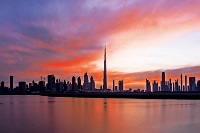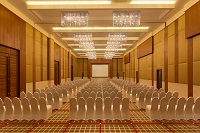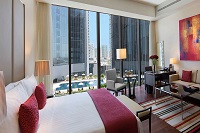Venue & Hospitality
Conference Dates: April 21-23, 2016
Hotel Services & Amenities
- Audio/Visual Equipment Rental.
- Business Center.
- Business Phone Service.
- Complimentary Printing Service.
- Express Mail.
- Fax.
- Meeting Rooms.
- Office Rental.
- Photo Copying Service.
- Secretarial Service.
- Telex.
- Typewriter.
- Video Conference.
- Video Messaging.
- Video Phone.
- ATM.
- Baggage Storage.



Transportation
Driving Directions to
Dubai International Airport : 17 kilometres / 25 minutes’ drive
Abu Dhabi : 150 kilometres / 1 hour 30 minutes' drive
Sharjah : 35 kilometres / 45 minutes' drive
Burj Khalifa/Dubai Mall : 3.1 kilometres / 8 minutes' drive
Global Village : 27.1 kilometres / 22 minutes' drive
Route Map
About City
UAE history dates back to 5,500 BC, with the first known habitation of the area. Archeological evidence suggests those earliest inhabitants engaged in trade with their neighbor’s – a trait that remains vital to the country’s identity today. For two and a half millennia, the Gulf coast has been a crossroads of the world. From the Persian Royal Road to the Han Dynasty’s Silk Road, from the trading posts of the 19th century to the hypermodernity of today’s UAE, people have always converged here. They come not only to do business but also to share ideas, experience and inspiration. The Middle East has for thousands of years been a meeting point of religions, culture's and trade routes, but the newer states of the United Arab Emirates have in recent years acquired growing importance as an academic hub at the crossroads of Africa and Asia, Europe as well as of the US, with the building of a number of universities and satellite campuses. The UAE enjoys a strategic location on the new Southern Silk Road between Asia, Africa and Europe, a situation that provides optimum trading conditions and means the UAE is poised to take advantage of economic activity among the world’s fastest growing and developing economies as part of the ‘South-South’ trade trajectory. Thousands of Chinese businesses use Dubai as a hub for Africa. Indian traders use the emirate to access the world. Latin American ‘multi-Latinas’ see Dubai as a launch pad into South Asia. Western multi-nationals use Dubai as a hub for the Middle East. Dubai is both a unique trans-continental trade hub and a nexus for innovation in the fields of technology, culture and the wider knowledge economy.
Dubai has recently attracted world attention through many innovative large construction projects and sports events. The city has become symbolic for its skyscrapers and high-rise buildings, in particular the world's tallest building, the Burj Khalifa. In addition, Dubai is home to other ambitious development projects including man-made islands, hotels, and some of the largest shopping malls in the region and the world.Dubai International Airport leads Paris, Hong Kong and London as the world’s busiest in terms of international passengers. Last year more than 70.4 million people passed through its terminals, and it has the highest footfall of any international airport in 2015. Dubai’s flag carrier, Emirates Airline, is also on track to become the biggest in the world while Dubai ranks sixth globally measured by air cargo traffic. The UAE continues to develop in areas ranging from environmental engineering to software development, and from film production to biotechnology. The country has the highest percentage of female high-school graduates who enroll in university anywhere in the world.
